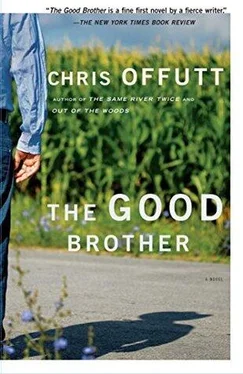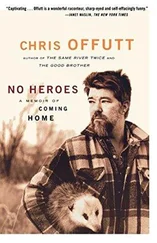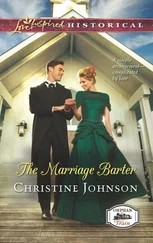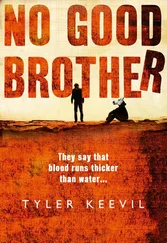“I am the New World Order.”
Joe stepped backwards and Frank moved with him.
“Do you have a warm coat?” Frank said.
“Not really. A jacket.”
“I’m glad to hear that. In Luke it says to sell your cloak and buy a sword. I get cold in winter sometimes, but my sword keeps me warm. The problem is too many people stay warm the wrong way, know what I mean?”
Joe nodded, willing to agree with anything to leave the room.
“You’re a good soldier, Joe. Now I want you to take some of those pamphlets with you up to the house. Go on and grab some. Don’t be shy. Take a whole pack.”
Joe crossed the room to the stacks of paper.
“Read them, Joe. Educate yourself.”
Joe tried to figure a way that the pamphlets weren’t as bad as he knew them to be. He told himself that having killed a man removed his right to judge.
“Take them, Joe.”
Joe faced Frank. He was very scared.
“No,” Joe said. “I won’t. You all got some good ideas, but those things are evil.”
“What do you know of evil? The Four Horsemen are riding black helicopters over Skalkaho Pass.”
Joe left the room and hurried outside. The valley opened before him, calming him with its vast presence of space and light. The landscape instilled a tremendous sense of loyalty, and he understood the desire to defend it.
He drove past the ranch house and up a rough slope to a clearing that overlooked the river. Sparrow hawks glittered in the field. He wanted to give Owen enough time to set Coop up and leave before Joe returned to the ranch. His sense of disbelief settled into confusion and fury. He wondered if Botree was aware of the pamphlets, then realized that she had to know. He felt as if he’d been betrayed by everyone but Ty. The Bills had duped him all along. Maybe he really was a dumb hillbilly.
Botree met him at the door. Coop was asleep in her childhood room, surrounded by feather and bone. The radio equipment glowed on a card table beside the bed. Botree went into the living room, and the couch creaked in the dark. Light from the stars slid past the curtains.
“I saw the pamphlets,” Joe said.
He sat in a rocking chair that faced the fireplace. His body was very tired. He felt overwhelmed by his feelings for Botree, undercut by loss and shame. The house hummed with quiet.
“I’m glad,” she finally said.
“You knew what they were doing?”
She nodded, a shadow moving in darkness.
“Were you in on it?” he said.
“No.”
“But you went along with it.”
“They’re my family.”
“What’s in those things is wrong.”
“It’s covered by the Bill of Rights.”
“Please.” Joe lifted his hand as if to ward off a blow. “I can’t hear any more of that right now. The only people who get to be free are the ones who think the same way as Frank.”
“I don’t think that way.”
“If those things aren’t against the law,” he said, “why did the ATF want to know who was making them?”
“Other stuff was happening all over the state. Idaho, too. People weren’t paying taxes. One family killed a deputy who came to serve a foreclosure notice on a ranch. Another man went in the bank and shot the loan officer. Some people got thrown in jail for buying antitank weapons. The Feds were looking for anything on anybody.”
“Were Coop and Owen part of that, too?”
“No, they’re not bad people. You know that. Somebody could have got them saving wetlands or spiking trees, and they’d have jumped on it. They were ready for whatever came along.”
“This is a whole lot different.”
“I know, Joe. I came back from Texas in bad shape. I didn’t know what to do.”
“How’d it start?”
“Frank. Nothing but Frank. He grew up here, and joined the service. After the war, he stayed gone another twenty years. He worked for the government, you know, one of those outfits he hates now. When I got home, he was here. He was fun and he was powerful and he could talk for hours. We were a big family. Frank thought the country was in trouble and people needed to protect themselves.”
“When did they start making the pamphlets?”
“Frank bought a handpress and they made flyers against the Brady Bill, and the assault-weapon ban. Then Frank gave them stuff from the Constitution and things the Founding Fathers said. When that ran out, they used quotes from the Bible. Next it was about Indians and Jews.”
“Anybody but themselves,”
“That’s why Johnny left the bunkhouse. He came and told me they wanted him to make new pamphlets. But he wouldn’t. Coop and Owen don’t really believe that stuff.”
“So what. They put it in the world,”
“It made Frank like them, Joe. That’s all any of us wanted. It was important.”
“You, too?”
“All of us. You have to understand, it felt good for people to be together. It’s been hard for small ranchers. All the new people moving in drove up our property taxes. They keep trying to pass bonds. They want to make Highway 93 four lanes wide now. We can’t afford to live here anymore.”
“That’s got nothing to do with the pamphlets.”
“What happened up in Idaho started it at Ruby Ridge. Then the gun laws. Frank didn’t talk about anything else. No more picnics or ballgames. He bought guns and everybody else did. Then we started burying them. They’re in PVC pipe all over the place, twenty-four inches below the surface. We put a decoy above them.”
“What do you mean, a decoy?”
“A piece of metal. That way, when the Feds came, their metal detectors would find the decoy. They’d dig to that and go on. They wouldn’t be able to get our guns later, when it happens.”
“When what happens?”
“It’s happening now, just like he predicted. After he sold those guns to the ATF man, people really believed him, because everything he’d been warning about started coming true. Then they killed all those kids in that church down in Waco.”
Thoughts flitted through Joe’s mind like blinks of light. Boyd could have lived easily among the Bills, enjoying the camaraderie of weapons, the flirtation with being a small-time outlaw. He’d have burned his driver’s license and Social Security card in front of the group. Under the right circumstances, he might have helped produce the pamphlets.
“Why didn’t you tell me?” Joe said.
“I was afraid.”
“Of what?”
“I was afraid you’d leave me.”
He went to Botree and swung her legs onto the couch and lay beside her. Their arms twined and he could feel her breathe. They held each other for a long time while outside the hillsides burned.
Thunder in the mountains meant the threat of lightning rather than the relief of rain. Day by day, Joe knew where the worst fires were by the hazy darkness of the sky. Communities were being evacuated near Missoula, but the ranch was safe. Coop was weak and often slept in a chair facing the CB unit. Two police scanners monitored the airwaves for official transmission. The combined sounds of the three machines reminded Joe of wind and water and rustling leaves.
The family saw no one but each other. They communicated by radio with their nearest neighbors who were in turn linked to people farther up and down the valley. The Bills were living battle-ready, alert to any change.
Botree received a message that Johnny was fine, and could be reached by radioing a man who worked at the Wolf. Late at night, Frank began broadcasting from the mountains nearby, long taunts of the government forces he felt certain were preparing to attack. As Coop listened, he drew possible routes of attack and escape on his topographical maps, blotting the soft brown and green lines with his own overlapping network of heavy black. As one map became illegible, he started another. He ate little and refused to bathe.
Читать дальше












